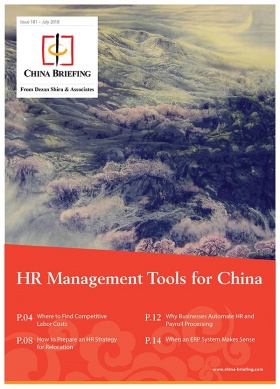How to Apply for CIT Incentives in China
China offers a number of preferential corporate income tax (CIT) policies for businesses operating in the country.
Businesses that qualify for these preferential policies can benefit from incentives like CIT rates lower than the standard 25 percent rate and other CIT exemptions and deductions.
These preferential tax treatments, however, do not automatically apply – businesses must first determine their eligibility and carry out the appropriate steps to benefit from the incentives.
This year, the government revised the policies for applying for CIT incentives.
In May, the State Administration of Taxation (SAT) released the Measures on Handling of Enterprise Income Tax Incentives and the Catalogue for Administration of Preferential Corporate Income Tax Policies (2017 Version) (the Catalogue).
The changes introduced in these documents streamline the application procedure for preferential CIT policies.
Rather than apply with the tax bureau, corporate taxpayers can now determine by themselves whether they are eligible for preferential tax policies, and enjoy the incentives when they make CIT returns (at the time of pre-payment or final settlement, depending on the specific incentive).
However, as the onus of determining eligibility is now on the taxpayer, they must accurately assess their status and comply with relevant regulations. Failure to do so could result in taxpayers having to pay back their full tax liabilities, and could also expose them to potential fines and other penalties.
What’s the change?
Before 2015, taxpayers had to acquire pre-approval from the tax bureau to be eligible to claim CIT incentives. Businesses that failed to obtain approval beforehand risked not being able to enjoy the preferential policies at a later date.
In 2015, China simplified the system so that taxpayers no longer had to make record-filing with tax bureaus before making tax declarations and claiming tax benefits. Rather, they could claim benefits and complete record-filing with the tax bureau afterwards, but no later than the Annual CIT Reconciliation Report.
In 2018, the process was further simplified. Now, if a taxpayer determines that they are eligible for preferential CIT policies, they must simply make the relevant tax declarations, without the need for record-filing with the tax bureau before or after.
Still, taxpayers should keep relevant business records and tax documents as they may be subject to future examinations by tax authorities. Documents that should be kept include contracts, agreements, certificates, documents, accounting books, etc. These should be retained for at least 10 years from after the policy is applied.
Businesses that fraudulently claim eligibility for preferential CIT rates may be penalized by the authorities.
What are the requirements?
The latest Catalogue includes 69 tax items that are covered by the simplified procedures. These include incentives for small- and medium-sized enterprises, companies established in western China, and businesses engaged in high-tech industries, etc.
For example, certain companies in development zones can benefit from a 15 percent CIT rate, as can high-tech companies. Eligible software enterprises may benefit from CIT rates as low as 10 percent.
The Catalogue also clarifies what documents should be retained and explains the administrative procedures for different types of CIT incentives. The complete Catalogue can be found here.
Based on China’s CIT Law, CIT is prepaid on a monthly or quarterly basis in accordance with the figures shown in the accounting books of the company; companies are required to file CIT returns within 15 days from the end of the month or quarter.
Further, the SAT requires companies to submit an Annual CIT Reconciliation Report within five months after each year-end to determine if all tax liabilities have been met, and whether the company needs to pay supplementary tax, or apply for a tax reimbursement.
Companies engaged in diversified businesses should be especially mindful that the SAT requires separate accounts to be prepared both for sales that meet the conditions for preferential treatment and those that do not. If eligible sales cannot be clearly differentiated, they are not entitled to preferential treatment.
They also need to pay attention to other relevant certificates for qualification. There are special tax benefits for companies in encouraged industries, such as high-tech and environmental protection. However, in most cases, even if a company does qualify, it still needs to obtain certificates from relevant government departments to show its specialty in such areas to the tax authority.
This article was originally published on December 9, 2015, and has been updated to include the latest developments.
About Us
China Briefing is produced by Dezan Shira & Associates. The firm assists foreign investors throughout Asia and maintains offices in China, Hong Kong, Indonesia, Singapore, Russia, and Vietnam. Please contact info@dezshira.com or visit our website at www.dezshira.com.
- Previous Article Why Businesses Automate HR and Payroll Processing in China
- Next Article Shanghai Business Registration: Online Platform for Foreign Invested Enterprises Launched








